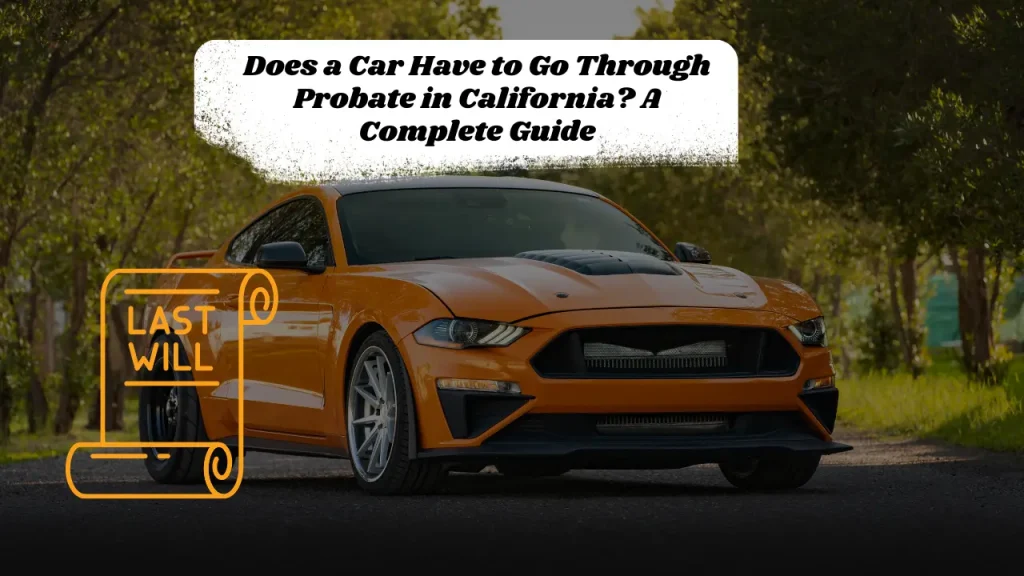Does a Car Have to Go Through Probate in California? A Complete Guide
Yes, but not always. Whether a car must go through probate depends on how the vehicle is owned and the total value of the deceased’s estate. In many cases, cars can bypass probate, saving time and money for heirs. This guide explains when probate is required, how to transfer a car without probate, and the steps to take for a smooth process.
According to the California Courts, probate can take 9 to 18 months on average, delaying asset transfers and potentially incurring legal fees. (Source: California Courts)
When Does a Car Need to Go Through Probate in California?
- In California, a car typically does not need to go through probate if:
- The total value of the deceased’s estate (excluding the car) is $184,500 or less (as of 2025) 16.
- The car is jointly owned with rights of survivorship (e.g., joint tenancy or community property with a spouse) 110.
- The car has a transfer-on-death (TOD) registration, which allows it to pass directly to a named beneficiary 68.
- However, probate may be required if:
- The car is solely owned by the deceased, and the estate’s total value exceeds $184,500 69.
- The car is part of a larger estate that includes other probate assets, such as real estate or bank accounts 610.
When Can You Avoid Probate for a Car in California?
You may be able to bypass probate if:
- Small Estate Affidavit – If the entire estate is under $185,125, heirs can file a “California DMV Affidavit for Transfer Without Probate” (REG 5 form). (California DMV)
- Joint Ownership – If the title lists “joint tenants with right of survivorship,” the car passes automatically to the surviving owner.
- Transfer-on-Death (TOD) Beneficiary – If a TOD designation is on the title, the named beneficiary receives ownership without probate.
- Living Trust – If the deceased placed the car in a revocable living trust, it transfers directly to the beneficiaries.
Related article for you:
Who Gets Probate Rental Income? Everything Heirs & Executors Must Know!

How to Transfer a Car Without Probate in California
If the estate qualifies for a simplified process, you can transfer a car without probate using the following methods:
1. Affidavit for Transfer Without Probate (Form REG 5)
This form allows heirs to transfer a car title 40 days after the owner’s death, provided the estate’s total value is under $184,500 28.
Requirements:
The car must be titled in California.
The heir must provide a death certificate and complete Form REG 5.
No court involvement is required 48.
2. Joint Ownership with Rights of Survivorship
If the car is jointly owned, the surviving owner automatically inherits the vehicle without probate 110.
3. Transfer-on-Death (TOD) Registration
A TOD registration allows the car to pass directly to a named beneficiary, bypassing probate entirely
What Happens If the Car Goes Through Probate?
- The executor must list the vehicle in the probate inventory.
- The probate court will determine the rightful heir.
- The car may need to be sold to settle debts.
- The process can take months, delaying vehicle access for heirs.
Common Questions
How long does probate take in California?
Probate takes 9 to 18 months on average. (California Courts)
Can I sell a car while it’s in probate?
No, unless authorized by the court.
What if there’s an outstanding loan on the car?
The heir who inherits the car must continue making payments or refinance the loan.
Can I Drive a Car During Probate?
Yes, as long as the car is insured. However, the executor must ensure the vehicle is properly maintained and accounted for.
What Happens If the Estate Doesn’t Qualify for Simplified Probate?
If the estate exceeds $184,500, the car must go through formal probate, which can take 6–18 months.
Final Thoughts
Probate can complicate car transfers, but California offers several ways to avoid it. If you’re inheriting a vehicle, check its title, see if the estate qualifies for a small estate affidavit, or consider legal assistance.
For more information, visit:
About the Author

Sarah Klein, JD, is an experienced estate planning attorney who has helped clients with wills, trusts, powers of attorney, and probate matters. At All About Lawyer, she simplifies complex estate laws so families can protect their assets, plan ahead, and avoid legal headaches during life’s most sensitive moments.
Read more about Sarah
